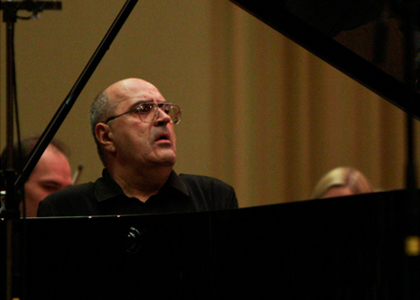> [Archived] Interviews

Interview with the pianist Dan Grigore
Maestro Dan Grigore, what must a pianist have to play Rahmaninov 2?
A long time ago, when Cortot was being asked what a pianist must have to resist during tours would respond with: He requires only two things: a good sleep and a healthy stomach. To play Rahmaninov, I think you need more than a good stomach and sleep; I think you also need an exquisite ear, a harmonical one, a sensuous one, which he richly had- these harmonical connections were abundant in his case... Earl Wild is a great American pianist and composer who has also been a classical music interpreter and has played all Rahmaninov's concertos. He created certain arrangements inspired by Rahmaninov's songs, by Gershwin's. I actually consider of playing a bis, if the audience wants it, a Study by Earl Wild on a song by Gershwin which Ella Fitzgerald used to sing, called "Embraceable you". Earl Wild plays Rahmaninov very well also because he's a very good jazz pianist. I would have thought that Friedrich Gulda could have played it better...Rahmaninov didn't interest him, although he had an extraordinare harmonical ear, he didn't quite like Rahmaninov. Generally, he has been a peculliar man. But what had drawn me to Rahmaninov is a resemblance with Lipatti, not only as a pianist, but also as a composer. Meaning, he, as a composer, creates a passage between the parts of his concertos or sonatas, the big compositions- it is a gradual flow from the tonal point of view, just like Lipatti was doing his passages from one play to another during a concert. He was doing a small rhytmic improvisation which linked the former play's tonality to the next one's. This style of Lipatti I have found in Rahmaninov's concertos, in his sonatas, in certain plays. This is a feature which connects in time, over geographies, over times two great musicians. And this thing impressed me, the way in which Rahmaninov would hear the tonal discourse and its journey.
All this unleash which you are telling about is indeed a journey through tonalities, moods, harmonies and aspects, evetually.
He's like a sort of a hero of a picaresque novel-what happens to a picaro, to a wanderer. Rahmaninov composes these concertos as if they were his travell journals. At 12 years old, I had a revelation while listening the third concerto by Rahmaninov with Gilels on the radio and then the second concerto with Ciccolini and Silvestri, with the Conservatory Orchestra from Paris, I had this revelation- each time, he is writing the journal of an odyssey where he is Odyssey, Ulisses. He is gone searching the elixir, of that something...a misterious goal of each human destiny.
This aspect which you told us is very interesting, because he is both the hero and the creator of the hero. There are many layers, eventually...
He also tells the story of this transforming journey which himself blesses at the end of each concerto, because any composer is in his own way a demiurge...he blesses it, he redeems it with an optimistic ending. Even the Concerto no.4 which is a very pessimistic one, has a tragical and optimistic ending, almost forced...
A contradiction...
...like some kind of a faith confession on the gallow, like an apostleship, because we know Rahmaninov has been a very religious man. For a long time, his religious music has been banned in the Soviet Union, but he wrote High Masses, vespers, some for the choir, some for the orchestra...Many times, in his piano music this core is existant, not necesarily being a mistical one, although I'm not afraid of this mistical core. There is a mistique of things, there is a...
Rather the spiritual core, the faith one...
...let's say the spiritual core, although it's not only that, it is an aimed spirituality, a well oriented antenna towards something which Rahmaninov sees and which it sees Rahmaninov, something which is controlled only by Rahmaninov.
Translated by Matei Denisa
MTTLC, University of Bucharest














